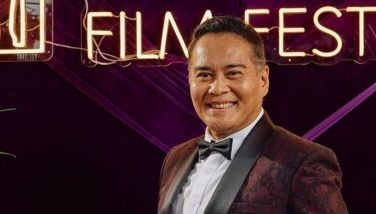Life with & without my father
February 18, 2007 | 12:00am
 (Editor’s Note: On Feb. 22, Thursday, the Tribung Pilipino Foundation headed by Remember When? columnist Danny Dolor pays tribute to Tito Arevalo in association with the National Commission for Culture and the Arts (NCCA). The tribute will be held at the Leandro Locsin Theater, NCCA Bldg., Intramuros, Manila. Sylvia la Torre, Liza Cabahug, Alexis Edralin, Vladimir Valera and Robert Arevalo will sing songs composed by Tito Arevalo. Speeches will be delivered by Marichu Maceda, Gloria Coronel, Digna Santiago and Cecile Guidote-Alvarez. Robert, son of Tito Arevalo, will give the response on behalf of the family. He writes this piece for Remember When?)
(Editor’s Note: On Feb. 22, Thursday, the Tribung Pilipino Foundation headed by Remember When? columnist Danny Dolor pays tribute to Tito Arevalo in association with the National Commission for Culture and the Arts (NCCA). The tribute will be held at the Leandro Locsin Theater, NCCA Bldg., Intramuros, Manila. Sylvia la Torre, Liza Cabahug, Alexis Edralin, Vladimir Valera and Robert Arevalo will sing songs composed by Tito Arevalo. Speeches will be delivered by Marichu Maceda, Gloria Coronel, Digna Santiago and Cecile Guidote-Alvarez. Robert, son of Tito Arevalo, will give the response on behalf of the family. He writes this piece for Remember When?)
Let’s begin with his death. My father, Eustacio Ylagan, better known as Tito Arevalo, died on Dec. 4, 2000. He was to turn 90 on March 29 of the succeeding year. He had been terminally ill for about nine months. I remember weeping like a child when I got home, after being told by the doctor the results of his medical tests. Without talking about it, he knew about his condition.
To the very end, my mother was in a state of denial. That’s why when death was impending, we brought him to the hospital instead of letting him breathe his last at home beside her. We allowed her to pretend that Father would come back home after a few days of treatment at the hospital. Up to now I’m not sure if that was the right thing to do. My sister, Cora, and my daughter, Anna, and I were with him during his last moments. I remember telling him not to be afraid, as we would be there till he breathed his last.
It must seem corny and sentimental now, but I remember singing softly into his ear the Maria Clara song he wrote for the film Noli Me Tangere, the lyrics of which "…kamatayan ay di gaano ang pait kapag kapiling mo ay pag-ibig," were lifted from Jose Rizal’s poem in that novel.
Every Christmas Eve, my wife Barbara would prepare a Noche Buena salo-salo at home. My parents lived just next door. They would come around together every year. When my mother’s knees became arthritic, we went to her room to greet her instead, but my father would quietly, almost surreptitiously, come to our house and mingle with family members. Then, he would just as quietly leave at the height of merriment, without anyone noticing his French leave. Up to now, every Christmas Eve, we somehow half-expect his quiet appearance at the party.
I was six when my father taught me to sing a kundiman. It was not his own composition. It was Velarde’s Ikaw Ay Akin, my favorite at the time. The piano on which he would provide accompaniment to my singing is in a corner of our living room now. A few months before he died, my father took me aside and told me to take the piano to my home and keep it. My father bought that piano when I was about three or four. He would play Gershwin’s Rhapsody in Blue on it when I would sit on the sofa, mesmerized by the dexterity of his fingers and the beauty of Gershwin’s melody. Claire de Lune was also my favorite. When I was about 13 years old, I would be with him in the music room up to very late in the night when he would compose songs for his film scores. He would tell me later that the title Irog, Ako Ang Mahalin of the mega-hit song of the ‘50s was mine, but I don’t remember having conceived it.
My mother is now 93 and still alert and lucid, but she has told me a thousand times perhaps, that my father was her first and only love. She was only 13 when she had M.U. of sorts with my father. Father was about 16 at the time. She must have been the inspiration of the song, Magandang Bituin which was one of the earliest songs of my father.
My father grew up in a house on G. Tuazon St., Sampaloc. He lived there with his brothers and sisters who were all good-looking. Most of them became movie actors after doing stints in zarzuelas staged by my grandfather, Hermogenes Ilagan. Angel Esmeralda, father of the late Jay Ilagan; Gerry de Leon, father of Liberty Ilagan; Conrado Conde, father of Ruben Ilagan; Edo Nagali lived on that street in the house the neighbors good-naturedly called "Ang bahay ng magagandang lalaki" or "house of handsome men." When I became an actor in 1960, a production staff head met my father at the Premiere Studio lot, where I was shooting my first film, Huwag Mo Akong Limutin, and tactlessly, although honestly, told him "Mas guapo ka sa anak mo." ("You are more handsome than your son.") I was told that the biggest female star in the same studio made the same remark to my father. Well, I suppose genes can only do so much.
We still keep a framed photo of my father, Tito Arevalo, together with my mother, Guadalupe Francisco, on top of the piano he bequeathed to me. I learned to play only one song, Tenderly, musical chords and arrangement taught by him, and everytime I play it, I would catch a glimpse of my father’s photo. He seems to be telling me, "Mas magaling din akong tumugtog ng piano kaysa sa iyo." That is why I often wish he was still around, playing Rhapsody in Blue or Claire de Lune and I was still a boy listening, mesmerized by the dexterity of his fingers and the beautiful melody of the tunes.
BrandSpace Articles
<
>
- Latest
- Trending
Trending
Latest
Trending
Latest
Recommended































